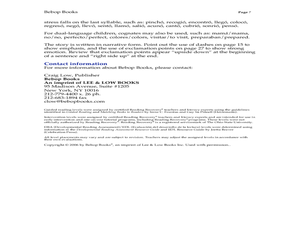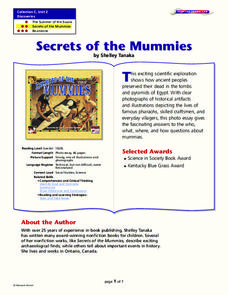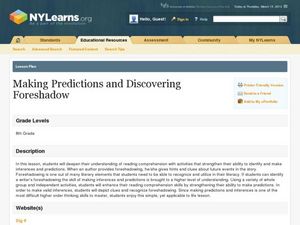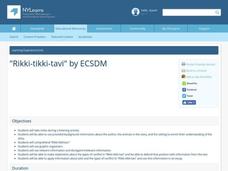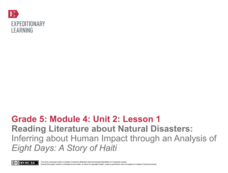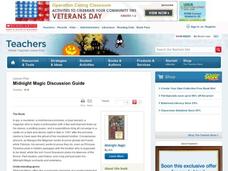National Endowment for the Humanities
Poems that Tell a Story: Narrative and Persona in the Poetry of Robert Frost
Dig in deeper with Robert Frost's, "Stopping by Woods on a Snowy Evening." Learners will read and discuss poems by Robert Frost and learn the meaning of terms such as narrative and personal. They journal, collaborate, and present poetry...
Curated OER
Mini-Lesson Planning for Inferences
Making inferences and drawing conclusions is a key component to successful active reading. Encourage your class to use context clues and prior knowledge to infer different elements of a story, including the setting, plot, and character...
Curated OER
Comprehension Strategies: Drawing Inferences
The proof is in the details! A richly detailed plan provides clear examples of how to draw inferences from text and how to provide support drawn directly from the text.
Curated OER
Identifying Setting and Completing a Story Map
Second graders complete a story map for Frog and Toad Are Friends. In this making inferences lesson students find specific details from the book to complete their story map. They map one chapter at a time.
Southern Nevada Regional Professional Development Program
Reading Literature - An Occurrence at Owl Creek Bridge
“An Occurrence at Owl Creek Bridge,” Ambrose Bierce’s short story, is used to model how structural moves, the decisions an author makes about setting, point of view, time order, etc., can be examined to reveal an author’s purpose. Groups...
Curated OER
Build Mastery: Making Inferences
Do your youngsters realize that they are constantly making inferences? Expose this inner process by bringing out the book they will be reading. Ask scholars what they think the plan is, and explain that their answers are the product of...
IPDAE
Themes in Short Stories
"What is the theme of this story?" The very question can spark fear in the minds of readers and incinerate confidence. Here you will discover an exercise that shows how writers use the tools of setting, plot, conflict, and...
Angel Island Immigration Station Foundation
How Do Pictures Tell the Story of Angel Island?
Young historians learn more about the history of Angel Island Immigration Station through their analysis of primary source images. Guided by a list of inferential questions, scholars learn how to make and record observations on a...
Curated OER
Guided Reading with Elizabeti's Doll
Practice reading strategies using Elizabeti's Doll by Stephanie Stuve-Bodeen. Readers utilize decoding and comprehension strategies before, during, and after reading the story. A detailed list of text features, high frequency words,...
Curated OER
Knights of the Round Table adapted by Gwen Ross
Everyone loves the tales involving King Arthur and his knights. After reading Knights of the Round Table by Gwen Gross, learners draw inferences and conclusions, analyze story elements, and discuss figurative language, including...
Curated OER
Secrets of the Mummies
How did the ancient people of Egypt preserve their dead so well that their bodies are still recognizable today? Learn the painstakingly complex process they used for preservation. Young scholars read and summarize a narrative detailing...
Curated OER
Making Inferences
Students discover how making inferences helps people solve problems. In this inference lesson, students read a story aloud and discuss problems as they occur in the story. Students work in small groups and use events in the text to infer...
Curated OER
Questions/Inferring
In this literature worksheet, students will analyze a story and prepare the chart by completing the two columns entitled "I wonder" and "I think" in accordance with a particular passage or piece of literature. Students will use...
NOAA
Journey to the Unknown
What's it like to be a deep-sea explorer? Tap into the imaginations of your fifth and sixth graders with a vivid lesson, the second part of a six-part adventure. Learners close their eyes and submerge themselves in an expedition aboard...
Curated OER
Foreshadowing and Making Predictions
"What happens next?" Using real-life scenarios, movies, images, and other prompts, pupils practice making predictions based on inferences from clues. A SMART board activity takes them from making predictions to writing a prediction...
Curated OER
"Rikki-tikki-tavi"
“Rikki-tikki-tavi” provides an opportunity to model for readers how to use background information to enrich understanding of a story. Class members observe animal behavior, listen to biographical background on Rudyard Kipling, study...
Curated OER
Making Inferences While Identifying Similes and Metaphors
Use this lesson to study similes and metaphors and the inferred meaning. In this language arts lesson, 5th graders write their own similes and metaphors. A worksheet is provided for extension work or to check understanding as homework.
EngageNY
Reading Literature about Natural Disasters: Inferring about Human Impact through an Analysis of Eight Days: A Story of Haiti
This is a disaster. Scholars look through the book Eight Days: A Story of Haiti and discuss their wonderings about the text and natural disasters. They then complete a first read to determine gist and second read to answer...
EngageNY
Analyzing Point of View: Inferring about the Natural Disaster in Eight Days
Who is telling the story? Readers take a look at the text Eight Days to determine if the story is told in first or third person. They then discuss in groups and complete a shared writing activity to describe how the narrator's point of...
Curated OER
"The Clever Monkey"
First graders read and discuss the story elements of the book "The Clever Monkey" by Rob Cleveland. They discuss the continent of Africa, then answer story comprehension questions. Students then complete words, adjectives, sequencing,...
PBS
Blue Ribbon Readers: Drawing Inferences
Model for young readers how to use illustrations, chapter titles, and events in a story to draw inferences and make predictions. Learners then practice these essential comprehension strategies by drawing inferences for another section of...
August House
The Great Smelly, Slobbery, Small-Tooth Dog
Read the story The Great Smelly, Slobbery, Small-Tooth Dog: A Folktale from Great Britain by Margaret Read MacDonald and choose from multiple activities to learn about the tale's theme—kindness. With so many options, your kind kids will...
August House
The Pig Who Went Home on Sunday
Turn your classroom into a pig sty with a instructional activity based on the Appalachian folktale The Pig Who Went Home on Sunday. Similar to the story of The Three Little Pigs, the folktale tells a story of four pigs who leave...
Scholastic
Midnight Magic Discussion Guide
This discussion guide accompanies the fiction book Midnight Magic written by Avi, enforces story elements, inferences, and theme/plot. Have the class work on it over time, it will engage even your reluctant readers.










